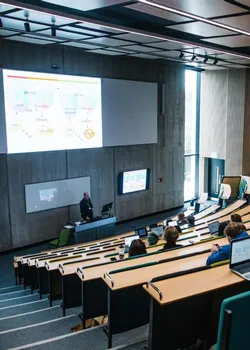Departmental news
SLS researchers contribute to UK Parliament report on horticulture
On 6 November, the House of Lords published a report entitled ‘Sowing the seeds: A blooming English horticultural sector’. The report looks at the development of the horticultural sector in England and includes citations from Professor Richard Napier and contributions from Professor Rosemary Collier and Alex Kelly.
Farming and Environment Award
Professor Rosemary Collier has been Highly Commended by the British Guild of Agricultural Journalists in the first Caroline Drummond Award, Celebrating and Communicating Farming Excellence. Rosemary will be presented with a trophy later in the year.
Find out about the awardLink opens in a new window.
The University of Warwick celebrates the successful harvest of "GODIVA" and ‘OLIVIA’ – two novel dry beans inspired by local cultural history.
Researchers at Warwick Crop Centre have celebrated the successful harvest of a homegrown bean developed to thrive in a British summer.
Press Release (9 September 2023)
Professor Eric Holub and research fellow Rosanne Maguire discuss the novel bean varieties on BBC CWR.
National Organic Month: Warwick Crop Centre's pioneering research into low-input farming
During National Organic Month, the University of Warwick's Crop Centre takes a pioneering stance in the realm of low-input farming, shedding light on the concept of 'organic farming.'
Press Release (1 September 2023)
Robocrop: The robot assistants helping farmers to increase productivity
The future of farming could involve robots– as farmers seek to address labour shortages and increase crop yields.
Warwick Crop Centre and WMG are working in close collaboration to combine their robotics expertise and plant science expertise to investigate how they can apply autonomous robotics to greenhouses and croppable fields.
Press Release (25 August 2023)
ENABLE workshop: Are the university learning environments as inclusive as we think?
 On Friday 29 September 2023, the School of Life Sciences will be hosting a free workshop: "Are the university learning environments as inclusive as we think? An investigation from the awarding perspective".
On Friday 29 September 2023, the School of Life Sciences will be hosting a free workshop: "Are the university learning environments as inclusive as we think? An investigation from the awarding perspective".
Based on a thorough data analysis from recent years and first-hand practical experience, the workshop will identify existing reasons for lack of inclusivity and unbiased awarding in biological science and related degree streams.
The workshop participants, comprising academic leaders, teaching professionals and a diverse student community, will also provide on consensus recommendations on how to close existing awarding gaps for a more inclusive learning and teaching environment throughout the UK.
Consensus recommendations will be published in a peer-reviewed journal.
Helping plants and bacteria work together reduces fertiliser need
Today, published in Microbiome, Dr Beatriz Lagunas and colleagues at the Universities of Warwick and Justus Liebig (Germany) have shown a new way to boost plant nutrient uptake and growth. This could reduce the need for fertilisers, an input to agriculture which can be harmful for the environment. Fertilisers can run into waterways, or get broken down by microbes in the soil, releasing the potent greenhouse gas nitrous oxide into the atmosphere.
Press release (3 July 2023)
The first British Baked Beans could be on the breakfast menu thanks to University of Warwick research
Professor Eric Holub, a plant scientist at Warwick Crop Centre, has developed Haricot bean varieties which can be sown in early May and harvested as a dry grain before mid-September, matching the UK's warmer months. Until now, it has been impossible for farmers to grow the haricot variety used for baked beans in the UK because they are incompatible with the climate.
Press Release (16 June 2023)
The story was also on BBC Breakfast. Watch it on iPlayer (from 22m 30s)
Honorary Fellow
 Professor Murray Grant has been re-elected as an Honorary Fellow of the Academy of the Royal Society of New Zealand. Fellows have made contributions to knowledge at the highest levels in their different fields and across disciplinary boundaries. Find out more
Professor Murray Grant has been re-elected as an Honorary Fellow of the Academy of the Royal Society of New Zealand. Fellows have made contributions to knowledge at the highest levels in their different fields and across disciplinary boundaries. Find out more
Can super-speedy plant cells feed a growing population?
 Dr Joe Mckenna has been awarded a BBSRC Discovery Fellowship of £535,000 to investigate actin – a natural molecule contained in plant cells – to see whether it can be engineered to move faster and so grow bigger plants with more biomass.
Dr Joe Mckenna has been awarded a BBSRC Discovery Fellowship of £535,000 to investigate actin – a natural molecule contained in plant cells – to see whether it can be engineered to move faster and so grow bigger plants with more biomass.
Press release (21 March 2023)
